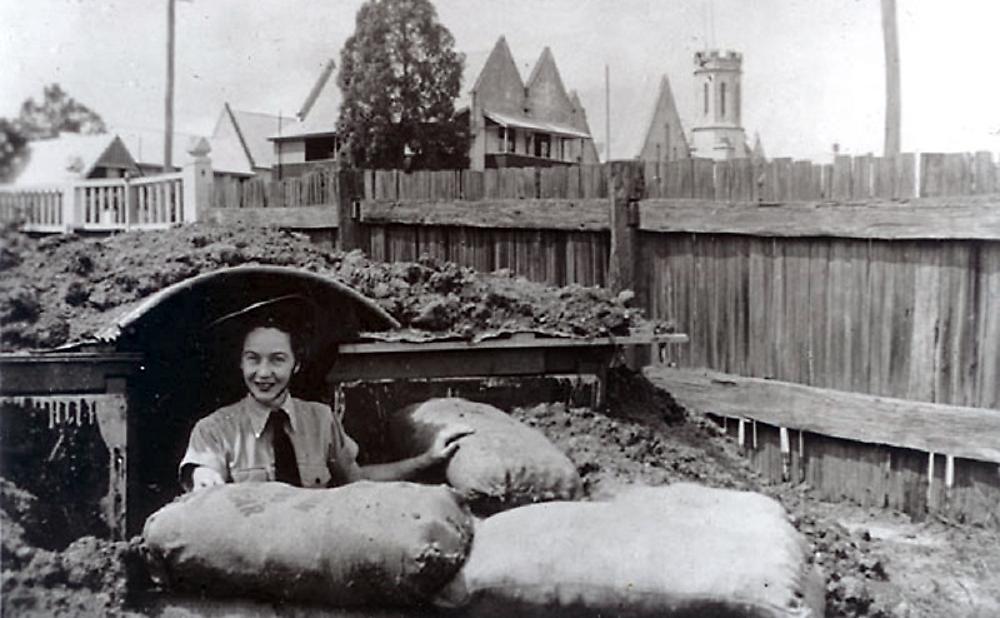This year is the 75th anniversary of Victory in the Pacific (VP) Day.
VP Day marks Japan’s unconditional surrender to the Allies after more than three years of war after the United States dropped atomic bombs on Hiroshima and Nagasaki.
At RAAF Base Amberley, the Japanese surrender was announced at 10.30am on 15 August 1945 by the Base Commander and all units were stood down from 15 August to the 17 August to celebrate.
On 10 June 1946, Ipswich held a Victory March.
RAAF Base Amberley had only commenced operation as a RAAF base in June 1940 and by early 1943 about 2290 personnel were at Amberley.
By the end of World War II, the RAAF was the fourth largest air force in the world.
Hiroshima on 28 February 1946. Looking south from the centre of the city, it shows only a section of the damage caused by the bomb. Image: Australian War Memorial
A crowd of civilians and servicemen are seen skipping and dancing during Victory in the Pacific Day on, George Street outside the Criterion Hotel, Bundaberg. Image: Australian War Memorial
With the scare from Japan’s surprise attack on Pearl Harbour those still at home took measures to protect the community.
First Aid Posts and volunteer firefighting teams were set up.
Elevated positions around the city, such as the tower at Ipswich Grammar School and the rooftop skylight at Ipswich Girls Grammar were used as fire watch stations.
Air raid shelters were built in the streets and slit trenches were dug at schools, businesses and at homes.
With World War II also came rationing. Ration coupons were issued for items such as petrol, tobacco, tea and butter to name a few.
The Ipswich community rallied together and sent food parcels, to Britain and knitted woollen clothing to homeless school children in England.
Ipswich City Vice-Regal Junior Band celebrating VP Day, 1945. The picture was taken outside Rissons on the corner of Nicholas Street and River Road. Image: Picture Ipswich
Manson Park on Cemetery Road, Raceview is a memorial site representing what had been a United States Armed Military Cemetery during World War II where 1260 American servicemen had been buried.
The monument was once the base of a flag pole which flew the American flag in the United States Armed Forces (USAF) Military Cemetery.
During World War II, many American servicemen died or were killed in action in Australia or surrounding regions and, as it was not possible to return their bodies to America for burial, a war cemetery was set up in Ipswich.
In 1947 the bodies were exhumed and returned to the United States.
Captain J.B. Harris, the American officer in charge of the War Graves Unit, later wrote to the Ipswich Cemetery Trust thanking it for ‘…accomplishing a resting place for our beloved deceased prior to their repatriation to their homeland and final resting place’.
WWII graves at the United States Armed Forces military cemetery. Image: Picture Ipswich
Today’s name, Manson Park, pays tribute to the work of a local woman Mrs Rose Manson, who cared for the graves during the war.
In an interview with an American newspaper, Mrs Manson said:
“Near my home in 1942 the Americans started a military cemetery. I had previously been caring for 98 Australian soldiers’ graves, so it seemed quite natural that I do the same for the Americans.
“I used 2 to do 50 to 60 graves every Sunday, until the number grew to over 1,400, so I decided to place one bowl of flowers every night on the base of the flag pole as a memory to every mother’s son.
“I wrote to the next of kin describing the cemetery and the burial, for I had seen from my home, every boy and girl laid to rest in that little valley.
“It was such a peaceful spot and as I looked over the valley at the blue hills beyond, it reminded me of God’s healing acts.
“In order to purchase stamps I cleaned my local post office every morning, while the little ones were still in bed.”
Letter from Rose Manson to Mrs Wheeler on 30 August 1944
Dear Mrs Wheeler
I thought you would like to know, that someone as far away Australia is caring for your ‘Loved’ one’s grave. Our garden overlooks the little Cemetery, and in appreciation for all your Boys have done for us – the token of flowers – is the least I can give to express my own personal gratitude. If you would care to write and ask anything – please do so. I would count it a privilege to be of service to you. Our best wishes.
Very sincerely yours
Rose Manson Mrs
Read also:

